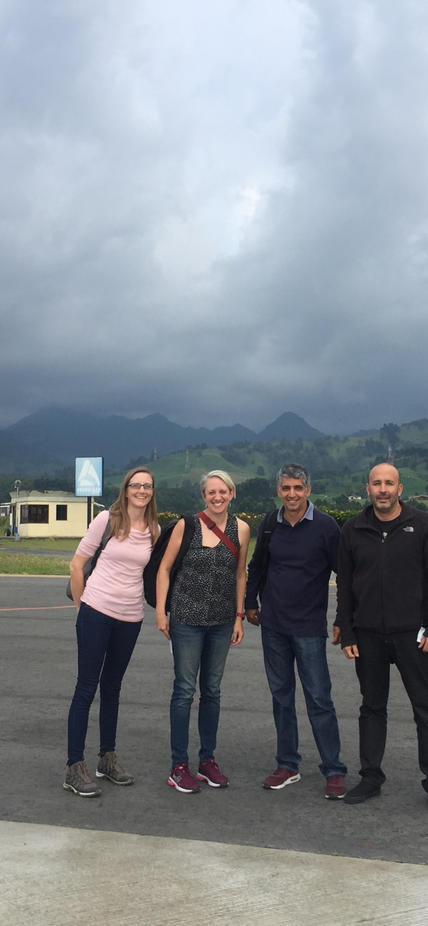Applications for 2022 are closed
After postponing the program for two summers due to the ongoing pandemic, Carnegie Academy for Science Education’s (CASE) Acting Director Marlena Jones has re-opened applications for the Modeling, Uplift, Seismology, and Igneous Geochemistry in the Colombian Andes (MUSICA) teacher workshop. Jones works together with long-time educator Katherine Ellins and the Principal Investigators of the MUSICA project: Lara Wagner from the Carnegie Institution for Science, Christy Till from Arizona State University, and Brian Horton and Thorsten Becker from the University of Texas at Austin.
Jones and her team are looking for six middle and high school teachers from Texas, Arizona, and Washington, D.C. The teachers will travel to Arizona in the summer of 2022 to attend a hands-on workshop where they will work alongside MUSICA scientists to learn firsthand how to conduct research from geological fieldwork through laboratory analysis and scientific interpretation.
Using what they learn in the workshop, the teachers will develop bilingual curricula to share with their classes and the broader science-teacher community.
“Teachers will work together with researchers to explore and experience geoscience field research,” said Jones. “Through participating in the project, teachers will have the tools and experience they need to invigorate their classrooms and provide students with real examples of how modern geoscience is done.”
During the workshop, the educators will work with scientists to compare and contrast Earth processes responsible for the Rocky Mountains and episodes of widespread, devastating volcanism in the western United States with similar processes occurring today at an active plate boundary zone in Colombia, South America.
The teachers will use what they learn during the workshop to create a series of four standards-aligned lesson plans related to the MUSICA project during the subsequent school year with support from the MUSICA team. Teachers will apply the lessons they create in their classrooms and present the lessons and the results of classroom implementation at a national or regional geoscience convention.
Wagner stated, “We’re hoping to give teachers a look at how modern Earth Scientists do their research, from finding samples in the field to interpreting the results obtained in the lab.”
Applications for the workshop are due Friday, February 4th, at 5 p.m. EST. To apply, teachers must fill out this web form. Find more details about the application below.
What is the MUSICA?
The educator workshop is an integral part of the more comprehensive MUSICA project, which aims to shed light on the complicated geological setting beneath the Colombian Andes. The project and the workshop are funded by the National Science Foundation.
Specifically, the project hopes to better understand flat-slab subduction. Flat slab subduction refers to a phenomenon in which subducting oceanic plates, which normally descend directly into the Earth’s mantle at a constant angle, change their subduction geometry. Instead, the plate sinks only around 50 miles and then shifts course to travel horizontally—or flat—for hundreds of miles beneath the continent before finally resuming its descent into the Earth.
Scientists believe that an episode of flat-slab subduction beneath the western United States was responsible for the formation of the Rocky Mountains and the extensive ore deposits of the Colorado Mineral Belt, as well as the widespread explosive volcanism that covered the western United States with silicic magma between 36- and 18-million-years-ago.
In Colombia, the MUSICA team has found a unique setting where a once extensive flat slab has split into two parts, one of which remains flat and one of which has comparatively recently returned to a more typical subduction geometry. This unique setting provides scientists with an opportunity for a natural experiment. The MUSICA team can directly compare the behavior of a “normal” slab to a flat slab for the first time.
The team will combine seismology, geochemistry, geochronology, basin analysis, structure, tectonics, thermochronology, and geodynamics to study the processes responsible for the mountain building, ore deposits, and volcanic hazards in Colombia. Overall, the project will provide scientists with a better understanding of how continents evolve and how volcanic events are related to flat-slab subduction.
The team aims to do much of its fieldwork in the summer of 2022, though plans continue to be adjusted due to the ongoing pandemic.
Workshop Details
-
The workshop will take place in Arizona from June 27 – July 2, 2022. June 27 and July 2 are travel days.
-
Before the Arizona workshop, teachers will participate in four one-hour virtual meetings to prepare for the summer field program and workshop: March 22, March 29, and April 26, at 8-9 PM EDT (7-8 PM CDT, 5-6 PDT/AZ). (Times may change depending upon team members selected.) The fourth meeting (also the pre-field meeting) will be held at 8-9 PM EDT on June 21st, 2022.
-
Following the workshop, teachers and scientists will participate in virtual meetings every other month during the school year
Application Details and Requirements
-
Complete the online form
-
Email the following four documents to case@carnegiescience.edu. Please include in the subject line "Teacher Externship -- your last name, your first name."
-
Resume (no more than two pages; include any science leadership experience as a separate section)
-
Personal Statement (no more than two pages)
-
Why are you interested in participating in this externship?
-
How might you incorporate these experiences into your classroom teaching?
-
-
Letter of Support from a member of your school's administration
-
Letter of Support from a colleague (educator)
-
-
Teachers will be contacted and possibly interviewed following application submission. Selected teachers will be notified by or before February 28th, 2022.
(Note: Only two teachers will be selected from each location.)
Deadline: Form and all documents should be submitted by Friday, February 4, 2022 at 5 PM EST.
Applications are closed
Applications here